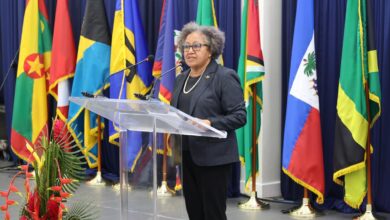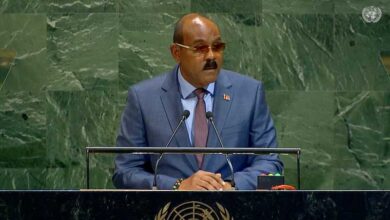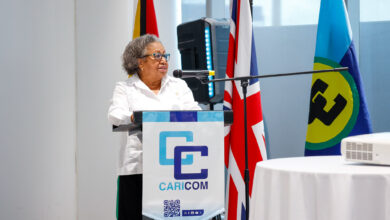CARICOM Secretary-General, Dr Carla Barnett delivered remarks at the Global Biodiversity Alliance Summit, today, in Georgetown, Guyana. According to the Secretary-General,
“We have been making steady progress driven by some key partnerships, but attention is needed to address enforcement and governance. It is recognised that capacity building and funding for environmental protection and regulation agencies remain priorities, as well as the need for strengthened mechanisms to enhance community engagement and local stewardship. And perhaps most importantly, we must do more to align biodiversity management and conservation with national development plans.”
See her full remarks below:
- Your Excellency Dr. Mohamed Irfaan Ali, President of the Co-operative Republic of Guyana;
- Excellencies Heads of State and Government;
- Founding Members of the Global Biodiversity Alliance;
- Representatives of Regional and International Organisations;
- Members of the Diplomatic Corps;
- Other Distinguished Delegates.
I am pleased to join you for this plenary session of the Global Biodiversity Alliance Summit, convened in one of the Region’s most biodiverse states.
I commend His Excellency Dr. Mohamed Irfaan Ali, President of the Co-operative Republic of Guyana, and our host, for this initiative which has brought together leaders, scientists, indigenous voices, and innovators in a positive move to consolidate global efforts toward biodiversity protection.
Biodiversity underpins the health of ecosystems, sustains livelihoods, and supports cultural traditions within the Caribbean Community (CARICOM). Our Community is a hotspot of biodiversity, rich with endemic species, coral reefs, mangroves, rainforests, wetlands and freshwater systems. CARICOM’s biodiversity isn’t just ecologically rich – it is economically vital as our rich ecosystems support food security, tourism, and coastal protection, while also offering vital services such as storm buffering and climate regulation. Forests in countries like Guyana, Belize, and Suriname store significant carbon, presenting opportunities for climate finance.
Less well-documented and understood is CARICOM’s rich genetic diversity. This holds significant potential for pharmaceuticals, cosmetics, and biotechnology. In addition, the traditional knowledge of indigenous and local communities which possesses valuable knowledge about species and ecosystems can be integrated into sustainable development and protected under intellectual property frameworks. This is an area that holds much potential, and which can benefit from increased technical and scientific cooperation, as well as strategic partnerships that can emerge under the Global Biodiversity Alliance.
CARICOM has played an important role in the multilateral environment and development agenda in advocating to safeguard global natural resources through the holding of significant conferences, including the first Conference of the Parties of the Convention on Biological Diversity in The Bahamas. CARICOM has also piloted resolutions on the sustainable development of the Caribbean Sea for present and future generations, and anchored the negotiations under the United Nations Convention on the Law of the Sea on Biodiversity Beyond National Jurisdiction.
Our biological resources, however, face a number of threats, including climate change, as this Region is particularly vulnerable due to our small landmasses, low elevation, and dependence on climate-sensitive sectors. Sea level rise threatens coastal habitats – mangroves, seagrass beds and turtle nesting sites, and resultant saltwater intrusion affects freshwater ecosystems. Warmer ocean temperatures trigger bleaching and mass die-offs in coral reefs, and as hurricanes and tropical storms become more frequent and destructive, they cause widespread habitat destruction, pollution, and displacement of species.
Man-made impacts present major threats to CARICOM’s biodiversity, and overexploitation of resources – such as through overfishing, illegal logging, and unregulated water use – alter ecosystems and threaten species.
As CARICOM seeks to balance economic growth and development with ecological sustainability, it has been actively responding to biodiversity loss through a mix of policy development, international collaboration, and regional initiatives. We have recognised that we must be proactive to flip the switch from vulnerability to resilience. Some of our key policy responses include:
- The articulation of the Caribbean Community Environment and Natural Resources Policy Framework, which is an umbrella policy to guide sustainable management of environment and natural resources across Member States.
- The Draft CARICOM Biodiversity Strategy, which is being aligned with the Kunming-Montreal Global Biodiversity Framework to promote harmonised conservation efforts and sustainable use of biodiversity resources.
- Vision 25 by 2025, now 25 by 2025 +5, the regional plan to reduce CARICOM’s food import bill by boosting local agriculture, which integrates biodiversity into food security and production systems.
- Proactive engagement in International Agreements and Treaties, as evidenced by the Region’s strong presence at the 16th Conference of Parties on Biological Diversity and our leading role in negotiating this treaty on biodiversity beyond national jurisdiction.
- Partnerships, for example, with the European Union, the Organisation of African, Caribbean and Pacific States and the United Nations Environment Programme, to build Member States’ capacity to implement the biodiversity cluster of multilateral environmental agreements.
We have been making steady progress driven by some key partnerships, but attention is needed to address enforcement and governance. It is recognised that capacity building and funding for environmental protection and regulation agencies remain priorities, as well as the need for strengthened mechanisms to enhance community engagement and local stewardship. And perhaps most importantly, we must do more to align biodiversity management and conservation with national development plans.
This Summit is therefore well-poised to allow for attention on how to encourage constructive engagements on partnerships in technical and scientific cooperation, and financing for biodiversity. It will also allow for discussions between commercial users of biodiversity with provider countries on areas, including access to financing and putting biodiversity back on the path to recovery.
It is my hope that the collective will demonstrated by your presence leads to results in positive outcomes that will safeguard biodiversity resources for current and future generations.
Ladies and Gentlemen, I thank you.






